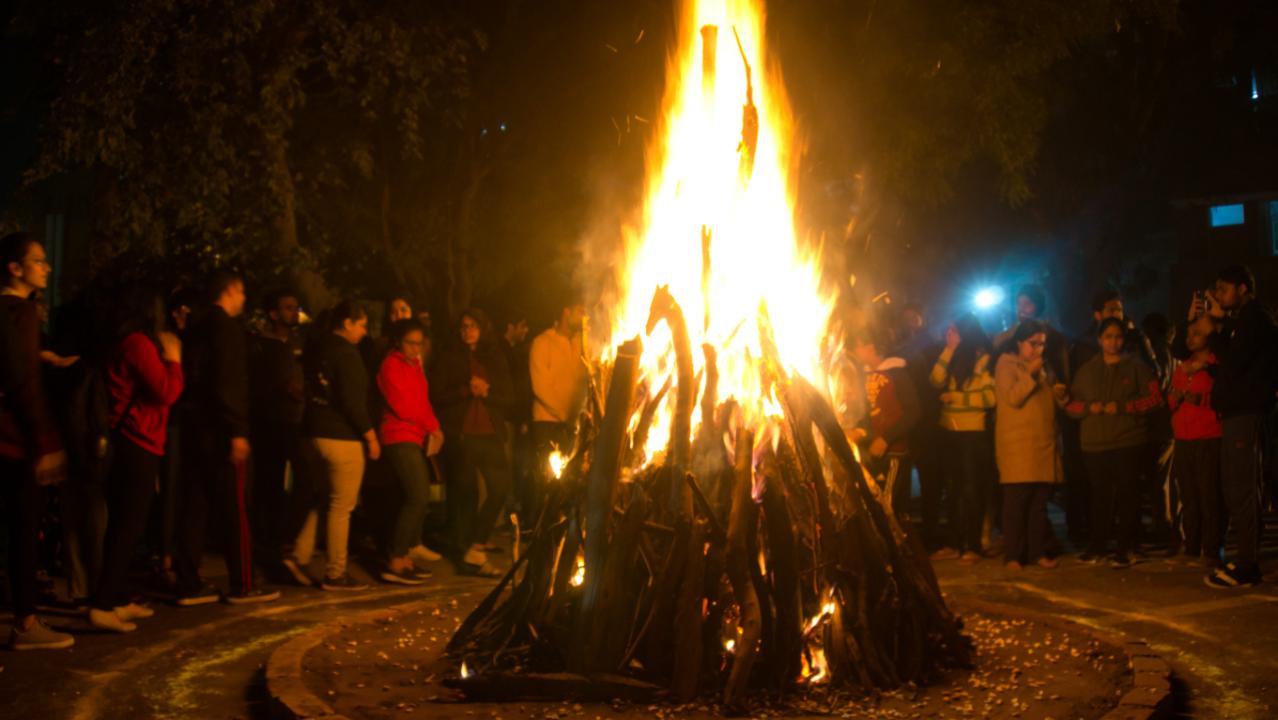This festival symbolises the ripening of winter crops as well as the start of a new harvesting season. Lohri is all about delicious food, family, and friends, along with traditional folk songs and dance.

Lohri is a winter harvest festival celebrated in north India. Image for representational purpose only. Photo Courtesy: istock
The new year brings with it different kinds of winter harvest festivals including Makar Sankranti, Pongal and Lohri, celebrated across many states. However, not many know the story around Lohri. This festival symbolises the ripening of winter crops as well as the start of a new harvesting season. It is all about delicious food, family, and friends, along with traditional folk songs and dance.
The auspicious festival of Lohri is widely celebrated by the people of Haryana and Punjab, particularly by the Hindu and Sikh communities. The festival also goes by the names Lohadi and Lal Loi and falls the day before Makar Sankranti. On this day, people light fires outside their homes or in public areas using wood and cow dung cakes, and then they perform Parikrama around the fire while offering sesame seeds, jaggery, gajak, rewdi, and peanuts. Along with harvesting the crops, they also offer the bhog they made from the crops offered to the fire.
Date and puja timings
The precise day on which Lohri should be celebrated is unclear this year. Many people are confused as to whether it falls on January 13 or 14. The celebration of Lohri will take place on Saturday, January 14, according to Drik Panchang. Makar Sankranti will therefore fall on January 15, on a Sunday. In addition, the Brahma Muhurta will last from 5.27 to 6.21 am and the Lohri Sankranti tithi will be at 8.57 pm.
History
The legend of Dulla Bhatti, who had lived in Punjab during the reign of Mughal Emperor Akbar, is the most well-known folklore connected to Lohri. He used to plunder the wealthy and aid the poor and those in need. Historiographers claim that he once saved a child from kidnappers and raised her as his own daughter. He even carried out the ceremonies without a priest on the day of her wedding. People began to sing the traditional song 'Sundar Mundriye' at Lohri every year because they loved and admired him.
Significance and celebration
Lohri and sugarcane products go hand in hand. If you are celebrating Lohri, you will be indulging in Gur (jaggery) along with gajak. Along with that, radish, spinach and mustard leaves (Sarson da saag) are essential items to be added to the menu and have been a delicacy since ancient times. Add makki di roti and there you have a feast to cherish. Apart from these dishes, you can munch on peanuts and til rice which is made up of sesame seeds, rice, and jaggery.
The festival to celebrate fertility and the joy of life. In the villages, while harvested fields and farms are dotted with bonfires, there is much more to the ritual. On cold winter mornings, people start roaming around to collect branches to make the bonfire. Children, too, get involved in the festival. They go from door to door asking for 'Lohri loot' and receive money along with til (sesame seeds), jaggery, peanuts, gajak, or rewari. The rooms of the houses are sprinkled with water as a ritual.
In the evening, people gather for 'Parikrama' and throw munchies like popcorn, puffed rice as well as rewari on the bonfire. Sugarcanes are also thrown into the bonfire as an offering. This spreads a fragrance of burning sugar all over. Apart from that, they pray 'Aadar aye dilather jaye' (may honour come and poverty vanish), seeking the fertility of their land and abundant crops. They then celebrate by singing and dancing to folk songs.
Revellers wear new clothes and exchange sweets. Lohri is also an auspicious festival for newlyweds and newborns. While newlyweds wear jewellery, newborns hold a comb as part of a ritual. It is festival of togetherness and the bond between friends and family. Light a bonfire and let the celebration begin.
Also Read: Lohri 2023: Wishes, messages to share with your family and friends
This story has been sourced from a third party syndicated feed, agencies. Mid-day accepts no responsibility or liability for its dependability, trustworthiness, reliability and data of the text. Mid-day management/mid-day.com reserves the sole right to alter, delete or remove (without notice) the content in its absolute discretion for any reason whatsoever
 Subscribe today by clicking the link and stay updated with the latest news!" Click here!
Subscribe today by clicking the link and stay updated with the latest news!" Click here!








